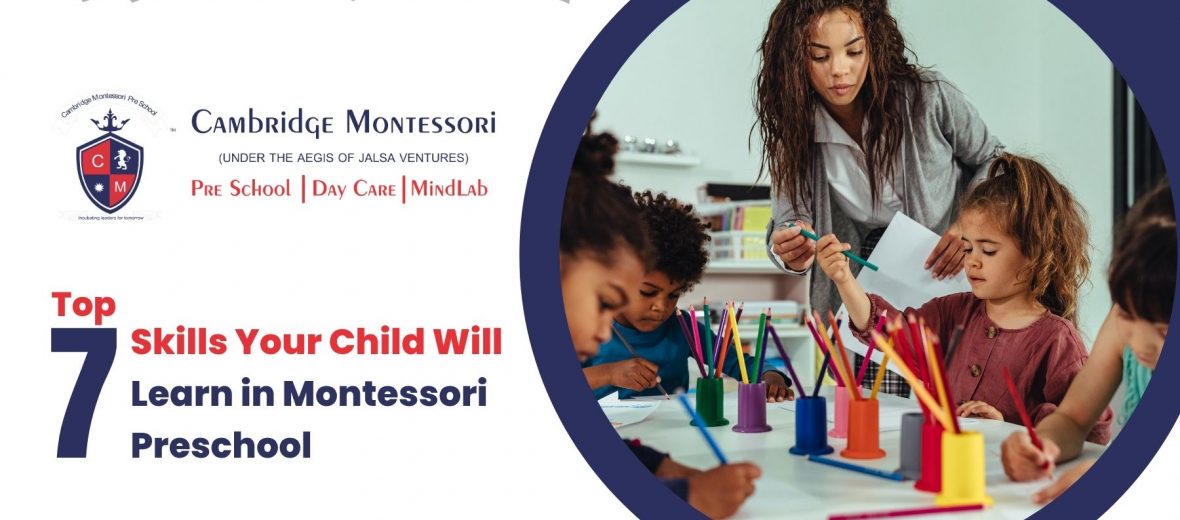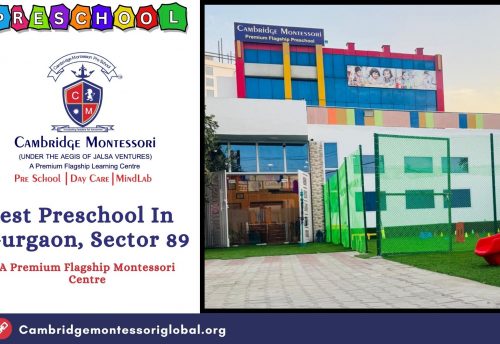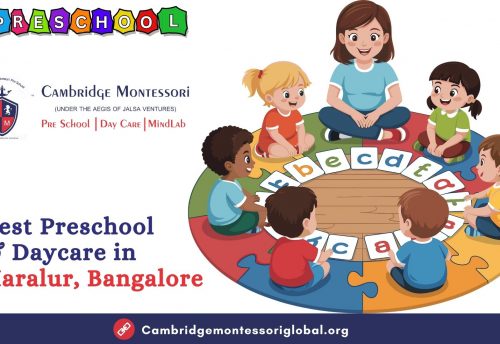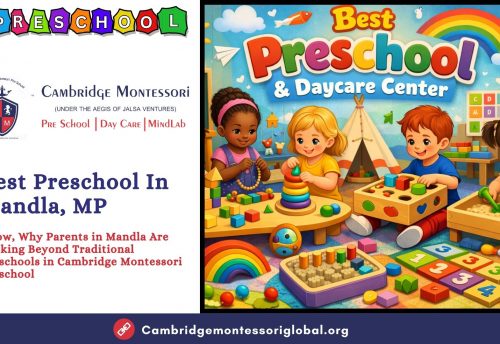
Top 7 Skills Your Child Will Learn in Montessori Preschool
Have you ever found that children study better when they are allowed to play on their own? It is the magic of Montessori preschool. It not only prepares them for school but also equips them with life skills that foster confidence, concentration, and independence.
While modern education often focuses on grades and tests, Montessori offers a different approach. It supports your child’s holistic development, physically, emotionally, socially, and intellectually, making a clear shift from conventional schooling.
This blog shows the best 7 skills your child would acquire in a Montessori preschool. Such skills extend beyond schoolwork, and they remain lifelong.
Why are skills more Important Than Education?
Education is a means of passing grades, while skills are essential for survival and growth in life. Skills enable children to overcome new challenges, remain curious, and achieve success in school, work and relationships. The best 7 we train in Montessori are as follows.
Practical Life Skills
Kids love doing real tasks. They do pouring water, tying laces, putting buttons in the shirt, and washing tables in Montessori. These simple preschool activities render children self-reliant and accountable. They also enhance hand-eye coordination and small muscle coordination.
In India, by picking a child’s school, you will ensure your child safely develops these habits. These are the life skills that enable the children to feel competent and confident. Your child will perform well in nursery and be prepared towards the next grades.
Sensory Development
Children acquire knowledge through their senses. Montessori classrooms have tools that sharpen the sense of sight, touch, hearing, taste, and smell. Kids learn by experience.
They can be given an example; they can be paired with sound cylinders, can be explored, or touch various textures. This type of learning makes them have an eye for detail and reason. It enhances concentration, memory, and problem-solving at a tender age.
Most nursery schools in India employ rote learning, but Montessori develops knowledge sequentially, which provides children with a more in-depth comprehension.

Early Literacy and Language Skills
Language succeeds in a natural environment. A Montessori preschool near me educates about words and sounds by playing games and telling stories, and talking.
Children do not automatically learn to memorise letters. They apply them in actual communication. Slowly, they begin to read, write, and speak. This fosters the feeling of confidence and makes learning entertaining.
This is the reason most parents choose the best early childhood education school in India. It renders the process of reading and writing pleasurable, hence children will acquire such habits independently.
Basic Mats and Problem-Solving
In Montessori, children are taught math using physical materials. Numbers are represented by beads, rods, and counters. Instead of going through worksheets, they view and feel numbers. This simplifies the learning process.
Such exercises enhance rationality and thinking. That is why Montessori is the best in early math confidence. Children like math by the time they get higher grades.
Social and Emotional Skills
The essence of learning is to build interpersonal skills to ensure that children relate freely. Children should be taught to respect and work together. Montessori classrooms are made in this way.
These activities improve logic and reasoning. That is why Montessori is one of the best preschools for kids when it comes to building early math confidence. By that time, they will reach higher grades, and they will love mathematics.
This arrangement develops sympathy, tolerance, and cooperation. In contrast to the conventional preschools, where students mostly concentrate on their studies, Montessori cares about kindness and emotional development as well.
Creativity and Imagination
All children abound in imagination. Montessori leaves it to help those who survive. Children express themselves freely through art, music, stories, and role plays. These are activities that foster innovation and problem-solving.
This is among the most significant assets of Montessori. Cambridge Montessori is the school of choice for parents seeking good preschool in their localities; it promotes creativity, besides academics.
Self‑Discipline and Focus
Montessori may look flexible, yet it forms discipline automatically. Children select their work and complete it before commencing another job. This is a lesson in patience and responsibility.
In the long run, children get to know how to remain attentive without prodding. This contrast explains why Montessori frequently outsmarts conventional preschools. It equips children with real-life challenges.
Conclusion
Now you know that Montessori is not just school preparation. It develops self-reliance, self-confidence, creativity and socialization. In Cambridge Montessori preschool, children develop into curious and able learners who are prepared for life.
If you are looking for the best Montessori school in India or a trusted preschool near me, visit Cambridge Montessori today and see the difference yourself.
Frequently Asked Questions
Q1. How does Montessori preschool differ from a traditional preschool?
Ans. Montessori follows the child and applies hands-on activities. It focuses on life skills. The classical preschool is instructor-centered, has a predetermined program, and focuses on memorization.
Q2. What are other skills that my child would acquire, other than academics?
Ans. Children become independent, problem-solving, concentrated, creative, and emotionally intelligent, which are skills critical in general development.
Q3. Why do parents choose Montessori over nursery schools in India?
Ans. Montessori integrates academics with life skills, and she produces confident learners who are fond of exploration.
Q4. How does a Montessori preschool prepare my child for lifelong success?
Ans. A Montessori preschool not only teaches reading, writing, and math. It develops fundamental life competencies such as independence, problem-solving, teamwork, and confidence, which prepare one to succeed in the long term.



